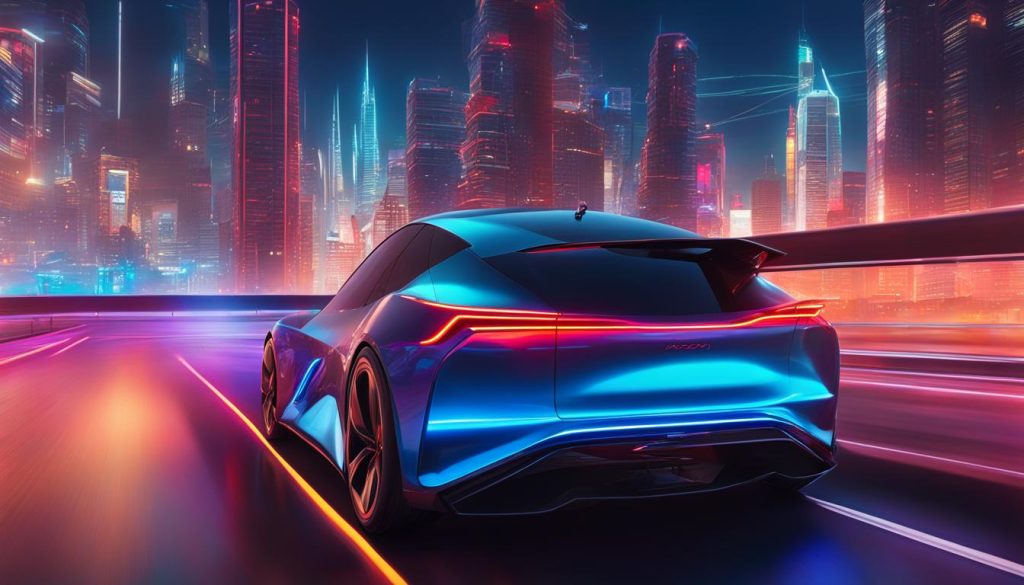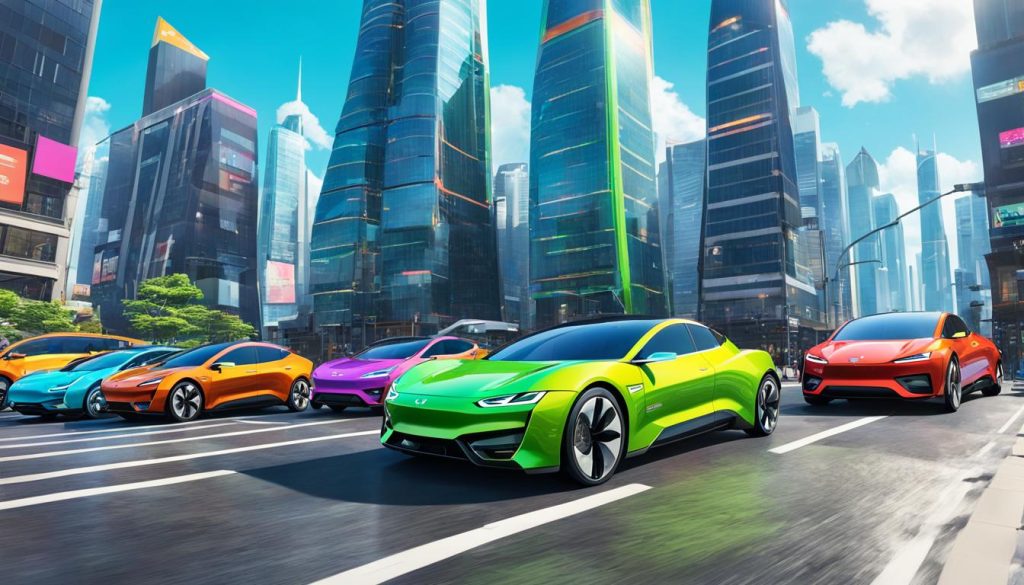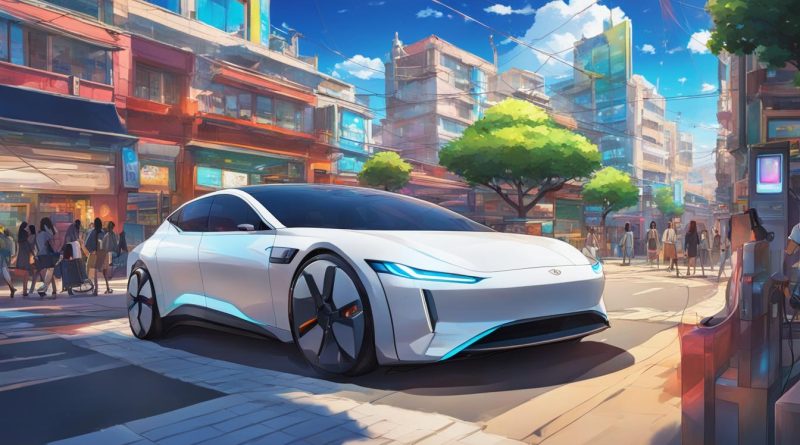Latest Electric Cars Trends & Insights
The electric car industry is on the cusp of a revolution that could transform the way people travel in the coming years. With innovations in EV technology and enhancements to charging infrastructure, electric cars are becoming more accessible and affordable to a wider range of consumers. In this article, we will explore some of the latest trends and insights in the electric car industry, including the benefits of electric cars, the growth of the electric car market, and advancements in electric car technology.
Key Takeaways
- Advancements in battery technology and charging infrastructure are revolutionizing the electric car industry.
- The benefits of electric cars, including lower emissions and reduced costs, are contributing to the growth of the electric car market.
- Government incentives and regulations are playing a crucial role in increasing the adoption of electric vehicles.
- Smart and connected features in electric cars are enhancing the overall driving experience.
- As electric car technology continues to evolve, the potential for this industry to revolutionize transportation and contribute to a more sustainable future is immense.
Advancements in Electric Car Technology
Electric cars have come a long way since their inception, with numerous technological advancements boosting their performance and appeal. One area where significant development has occurred is in battery technology. Modern batteries have improved energy density, resulting in longer driving range. For instance, the Tesla Model S has a range of up to 387 miles on a single charge, making it a viable option for long-distance travel.
Charging infrastructure has improved dramatically, with more public charging stations available to EV drivers. The network of Superchargers owned by Tesla, for example, now spans many countries, and the charging time has significantly decreased. As such, range anxiety is no longer the concern it once was, and long trips are now more feasible for electric car users.
Another area where electric car technology has made strides is in smart features. Modern electric cars are equipped with advanced driver-assistance systems (ADAS), which assist in driving-related tasks such as collision avoidance, lane departure warning, and adaptive cruise control. The Tesla Model S autopilot feature, for example, enables the car to steer itself on highways, change lanes, and adjust its speed to match the surrounding traffic.
Electric car technology has also had a significant impact on public transportation. Many cities are transitioning to electric buses, which have lower maintenance costs and produce zero emissions locally. London, for instance, has already invested in more than 200 pure electric buses, significantly reducing the city’s emissions.

As shown above, electric car technology has come a long way, and the pace of innovation shows no signs of slowing down. With continuous developments in battery technology, charging infrastructure, and smart features, electric cars are poised to become the vehicle of the future.
The Growing Electric Car Market
The electric car market is experiencing rapid expansion, thanks to increasing consumer demand for more sustainable transportation options. In the UK alone, electric car sales have grown from just 3,500 in 2013 to over 175,000 in 2020, a trend set to continue in the coming years.
One of the key factors driving this growth is the increasing affordability of electric vehicles. As battery technology has improved, the cost of manufacturing EVs has decreased, making them more accessible to a wider range of consumers. Furthermore, the total cost of ownership of an electric car, including fuel and maintenance, is lower than that of a conventional petrol or diesel car, making them an attractive long-term investment.
Another factor contributing to the growth of electric car market is the development of supporting infrastructure, such as charging stations. This means that electric car owners can travel further with confidence, without the worry of running out of power. Governments have also implemented various incentives and regulations to encourage the adoption of electric cars, including tax credits, grants and low-emission zones, making EVs even more appealing to consumers.

Overall, the electric car market is poised for continued growth, as more and more consumers realize the benefits of electric vehicles over traditional petrol or diesel cars. With further advancements in technology, increased investment in charging infrastructure, and support from governments, the future of the electric car market looks bright.
Conclusion
In conclusion, the future of transportation is looking electric. With the numerous benefits of electric cars, such as lower maintenance and running costs, environmentally friendly operation, and quiet driving experience, more and more people are switching to electric vehicles. The advancements in electric car technology have also led to improvements in battery range and charging infrastructure, making them a more practical choice for daily use.
The growing electric car market is a testament to the increasing demand for EVs. The adoption of electric cars by various demographics, such as ride-hailing companies and delivery fleets, is contributing to the wider adoption of electric vehicles and driving down costs. Government incentives and regulations have also played a significant role in the growth of the electric car market, with many countries offering tax credits and subsidies for electric car purchases.
The potential of electric cars to revolutionize transportation and contribute to a more sustainable future is enormous. With continued investment in electric car technology and infrastructure, the shift towards electric vehicles is only set to accelerate. The future of the automobile is electric, and we are witnessing the beginning of an electric car revolution.
FAQ
What are the benefits of electric cars?
Electric cars offer numerous benefits including reduced emissions, lower operating costs, quiet operation, and potential tax incentives. They also contribute to a cleaner and more sustainable future.
How far can electric cars travel on a single charge?
The range of electric cars varies depending on the model and battery size. Common ranges for electric cars today range from around 100 to 300 miles on a single charge. However, advancements in battery technology are continually extending the range of electric vehicles.
How long does it take to charge an electric car?
The charging time for electric cars depends on the charging method and the battery capacity. Standard home charging using a regular power outlet can take anywhere from a few hours to overnight. Fast charging stations can charge an electric car to 80% in around 30 minutes, while ultra-fast charging stations can provide an even quicker charge.
What advancements are being made in electric car technology?
Electric car technology is constantly evolving. Advancements include improvements in battery technology to enhance range and charging capabilities, the development of more efficient motors, and the integration of advanced driver-assistance systems and smart features.
How is the electric car market growing?
The electric car market is experiencing substantial growth. Factors such as increasing environmental awareness, government incentives, and improvements in charging infrastructure are driving the adoption of electric vehicles. As a result, sales of electric cars are steadily increasing year on year.
Are electric cars more expensive than conventional cars?
Electric cars are typically more expensive upfront compared to conventional vehicles. However, they typically have lower operating costs due to lower fuel and maintenance expenses. Additionally, government incentives and tax credits are often available, which can help offset the initial cost of an electric car.




